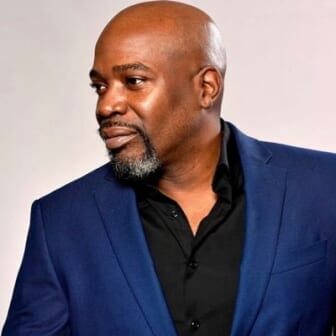We tried to tell y’all
OPINION: Black journalists, scholars and regular, shmegular citizens have been publicly screaming about the dangerous fear now known as the “great replacement theory,” and no one cared.
Editor’s note: The following article is an op-ed, and the views expressed are the author’s own. Read more opinions on theGrio.
Remember when Don Lemon was accused of spreading “unadulterated racism” because he said white men are the biggest terror threat in America? Does anyone remember when Joy Reid was called the “race lady” because she called out Tucker Carlson’s white nationalist ideology? Recall that intellectual debate over free speech after New York Magazine’s Andrew Sullivan said the goal of Ibram X. Kendi’s anti-racism was “running the country by fiat to purge it of racism” and antagonized Nikole Hannah-Jones because her 1619 Project failed to include a single chapter on penis mythology? When The Atlantic’s Adam Serwer warned about Carlson, Laura Ingraham, and Christopher Cantwell spreading white nationalist ideology four years ago, the pro-white think tank VDare and its followers offered their qualified white opinion.
There is a concept that I call the privilege of individuality—the idea that a white person’s actions don’t reflect upon white people as a whole. Because white people are accustomed to being viewed as individuals, when a white supremacist shoots up a grocery store, he is seen as a lone outlier and not a representative of a larger subset of white people. Even though a 2017 FBI brief “WSEs [White Supremacist Extremists] were responsible for 49 homicides in 26 attacks, more than any other domestic group,” the privilege of individuality means white people don’t have to bear the burden of disavowing the actions of racists. At most, they can simply deflect by painting any conclusions derived from statistical facts as an example of “reverse racism.” Or they can just ask: “But what about Chicago?”
But it wasn’t just white people. Jason Whitlock, who built a second career rooting against everybody Black, has attacked Colin Kaepernick, Jemele Hill, LeBron James and anyone who connected the dots between racial violence and Donald Trump’s rhetoric. John McWhorter eloquently explained how he doesn’t “need wider society to undergo teachings in how to be exquisitely sensitive” because racism affects his life “now and then at the margins, in very occasional social ways.” Candace Owens demanded an apology from her Black critics after she exposed the Democrats’ “evil plan” to flood America with immigrants. These people are the actual outliers. When it comes to defending whiteness and disagreeing with the Black consensus opinion, they are often more adamant about defending whiteness than their Caucasian counterparts.
I’d be remiss if I didn’t mention that I was called “the real racist” when I spoke about the GOP’s embrace of white nationalism in 2016. Maybe I was wrong in 2017 when I said, “one of the newest philosophies in the world of racism is the belief in white genocide—the idea that there is an organized effort to wipe out white people by outbreeding them, race mixing, promoting diversity and generally not allowing white people to rule the world. White genocide is the most laughable form of white tears because white genociders believe that whiteness is superior while simultaneously acknowledging that nonwhite DNA will eventually erase Caucasians from the face of the earth.” When I laid out how Trump dog-whistled this conspiracy theory in his tweets, no one cared. No one paid attention to it in 2018 when I screamed that Fox News was leaning into it. To be fair, I’m just some dude on the internet who has used data and research to teach, report on and write about white supremacy for a quarter of a century. What do I know?
Four years before the New York Times lamented Republicans’ acceptance of the great replacement theory, its national editor pushed back against its Black critics who denounced the paper’s sympathetic, weirdly uncritical profile of a white nationalist. “The point of the story was not to normalize anything but to describe the degree to which hate and extremism have become far more normal in American life than many of us want to think,” the Times explained. Now they are reporting on the tragic events of Buffalo.
It’s not like anyone told these outlets that all those stories about Trump supporters’ “economic anxiety” was actually racism. Perhaps they didn’t know that their newsrooms were overwhelmingly white. Too bad there wasn’t a single Black reporter—maybe someone with a Pulitzer—who could have told them that their version of “objectivity” was actually a version of whiteness.
If only they could have known.
This is not a victory lap or an I-told-you-so. There is nothing wrong with reading your favorite “trusted source for news” after their viewpoint has been filtered through the lens of white editors, producers and supervisors who want to offer “both sides.” This is just a reminder to anyone who believes that white people know what they are talking about.
There is an old saying that is almost universally understood among Black people but is universally challenged whenever a white person hears it—“Black people know white people better than white people know white people.”
Versions of this aphorism have been uttered by Black people, from Frederick Douglass to old Black preachers. It is borne out of the need to know one’s oppressor and centuries of self-preservation. It is one of the few things upon which Martin Luther King Jr. and Malcolm X both agreed. Perhaps James Baldwin said it most eloquently:
“Whatever white people do not know about Negroes reveals, precisely and inexorably, what they do not know about themselves.”
Told ya.
Michael Harriot is a writer, cultural critic and championship-level Spades player. His book, Black AF History: The Unwhitewashed Story of America, will be released in 2022.
TheGrio is FREE on your TV via Apple TV, Amazon Fire, Roku, and Android TV. Please download theGrio mobile apps today!
The post We tried to tell y’all appeared first on TheGrio.

